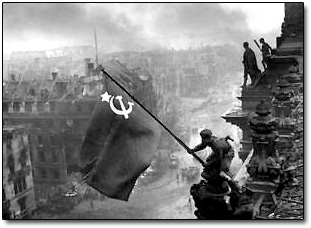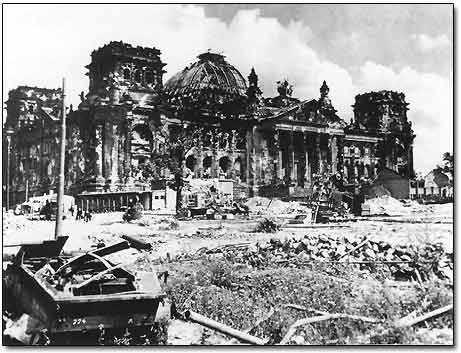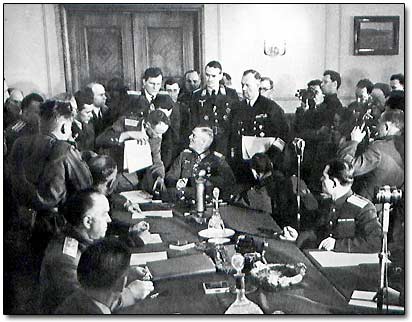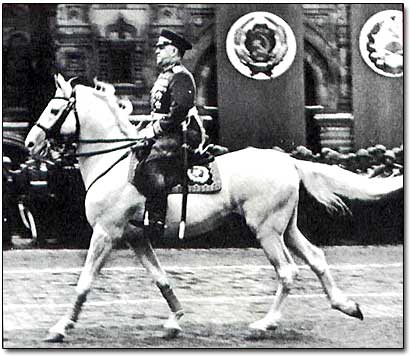World War II - Eastern Front, page 9
Brief Chronology and Historical Facts:
Red Army's Offensive to Capture East Germany, Surrender of All German Forces, Red Army Captures Berlin, End of World War II, Victory Day in Soviet Union
The offensive to capture East Germany and Berlin started on April 16 with an assault on the German front lines on the Oder and Neisse rivers.
By the April 24 elements of the 1st Belorussian Front and 1st Ukrainian Front had completed the encirclement of Berlin and the Battle of Berlin entered its final stages.
Approximately 100 miles southwest of Berlin, the Soviet 58th Guards Division of the 5th Guards Army made contact with the US 69th Infantry Division of the First Army near Torgau, Germany at the Elbe river.
On April 30, as the Soviet forces fought their way into the center of Berlin, Adolf Hitler married Eva Braun and then committed suicide by taking cyanide and shooting himself. Helmuth Weidling, defense commandant of Berlin, surrendered the city to the Soviets on May 2.
Raising Red Army Flag Over Reichstag in Berlin

Reichstag in Ruins

At 02:41 on the morning of May 7, 1945, at the SHAEF headquarters, German Chief-of-Staff General Alfred Jodl signed the unconditional surrender documents for all German forces to the Allies. The next day shortly before midnight, Jodl repeated the signing in Berlin at Zhukov's headquarters. The war in Europe was over.
Signing the Unconditional Surrender of All German Forces to the Allies

Celebration of Victory

In the Soviet Union the end of the war is considered to be May 9, when the surrender took effect Moscow time. This date is celebrated as a national holiday - Victory Day - in Russia and some other post-Soviet countries. The ceremonial Victory parade was held in Moscow on June 24.
Marshal Zhukov at Victory Parade in Moscow

German Army Group Center initially refused to surrender and continued to fight in Czechoslovakia until about May 11. A small German garrison on the island of Bornholm (Denmark) refused to surrender until after being bombed and invaded by the Russians. The island was returned to the Danish government four months later.
The Eastern Front of the European Theater of World War II was notorious for its unprecedented ferocity, destruction, and immense loss of life. It resulted in the destruction and partition of Nazi Germany, the rise of the Soviet Union as a military and industrial superpower, and the Soviet occupation of Eastern Europe.
WW2 Military Relic Hunting page